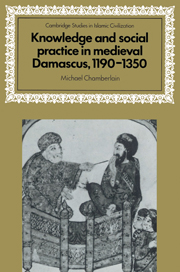Book contents
- Frontmatter
- Contents
- Preface
- List of abbreviations
- 1 Damascus and its surrounding region
- 2 Damascus in the thirteenth century
- Introduction
- 1 The acyān of Damascus, 590/1193–750/1350
- 2 Madrasas, the production of knowledge, and the reproduction of elites
- 3 Manṣabs and the logic of fitna
- 4 Social and cultural capital
- 5 Truth, error, and the struggle for social power
- Summary
- Bibliography
- Index
Preface
Published online by Cambridge University Press: 06 November 2009
- Frontmatter
- Contents
- Preface
- List of abbreviations
- 1 Damascus and its surrounding region
- 2 Damascus in the thirteenth century
- Introduction
- 1 The acyān of Damascus, 590/1193–750/1350
- 2 Madrasas, the production of knowledge, and the reproduction of elites
- 3 Manṣabs and the logic of fitna
- 4 Social and cultural capital
- 5 Truth, error, and the struggle for social power
- Summary
- Bibliography
- Index
Summary
It is sad but unavoidable that a single book can never pay off all the debts its production has incurred. This study began as an attempt to understand the social uses of knowledge by the learned elite of Damascus, and took me in directions I originally had no intention of pursuing. The book is aimed at a number of audiences, in part to acknowledge that it could never have been completed without borrowing from other disciplines. Having taken much from anthropologists, sociologists, comparative historians, and historians of China and the Latin West, I hope they will find something here to interest them in turn.
The notes are at the bottom of the page, not to give an impression of scholarly formidableness, but to allow the book to be read in two ways. Scholars of medieval Islamic history will notice that the notes not only are intended to support the argument, but in many cases to advance it. Scholars of other fields may read the narrative without reference to the notes.
This book, not to mention the greater part of my education, would not have been possible without my teacher Ira Lapidus. Without his example, I would have not tried to become a historian; without his guidance and support, I would never have made it thus far. I am also grateful to my teachers, William Brinner, Eugene Irschick, Hamid Algar, André Ferré, and others.
I must also thank the history departments at Berkeley, Stanford, and Wisconsin. This book would not have been possible without the support and good conversation I found in these three places.
- Type
- Chapter
- Information
- Publisher: Cambridge University PressPrint publication year: 1995

